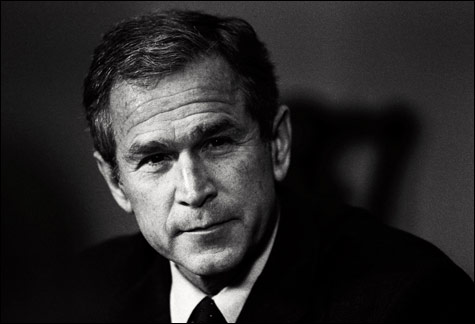
HA-HA: Rather than definitive history, Bush’s War often has the feel of a foreign-policy blooper reel. |
It’s tempting, five years into the Iraq War, to regard that conflict with fatalistic resignation. We invaded unnecessarily; we didn’t bring enough troops; the country’s a mess; we’re stuck there indefinitely. Really, what else needs to be said?
The great value of Frontline: Bush’s War (WGBH Channel 2, March 24-25 at 9 pm) is that it dispels this fatigued cynicism and replaces it with refreshed rage. As the program reminds us again and again, the Iraq War wasn’t merely a botched job. It was from its inception a case study in how not to practice statecraft — a farcically misguided, Keystone Kops–style enterprise that would be comical, in all its retrospective awfulness, if the human costs weren’t so high.

Much of Bush’s War has the feel of a foreign-policy blooper reel. Secretary of State Colin Powell learns that the Bush Administration has a new military-tribunal policy from watching cable news. Tommy Franks, the general and former head of CentCom, ponders the prudence of invading Iraq while drinking margaritas. Testifying to Congress, Deputy Secretary of Defense Paul Wolfowitz smirks at the idea that the invasion’s aftermath might require more troops than the invasion itself. Secretary of Defense Donald Rumsfeld expounds on the “messy” nature of freedom, jokes about the word “quagmire,” and waxes rhapsodic over the “beautiful, sunny” weather enjoyed by the Guantánamo Bay detainees. Ahmed Chalabi — who, with his sinister mien and perpetual sneer, may be the least-trustworthy-looking human in history — is embraced by the Pentagon and Dick Cheney as Iraq’s savior. And Coalition Provisional Authority head Paul Bremer follows his announcement of a sweeping de-Baathification program with an order disbanding the Iraqi military, thereby giving Iraqi insurgents a few hundred thousand potential recruits. If you can think of a high-level, high-stakes fuck-up — and there are plenty to choose from — chances are you’ll find it here.
This comprehensiveness attests to the job Frontline has already done covering the Iraq War, since most of the material is culled from 20 or so previous shows. (There’s also some new reporting and interviews that include illuminating conversations with Richard Armitage, the former Deputy Secretary of State, and Sir Christopher Meyer, Britain’s former ambassador to the US.) PBS is even touting Bush’s War as “the definitive documentary analysis of one of the most challenging periods in the nation’s history.” But the tight focus on diplomatic matters comes at a price. It’s clear that this stuff is important: without understanding the pre-war battles between the Departments of State and Defense, for example, you can’t understand why the war itself unfolded so disastrously. Even so, Bush’s War should have paid more attention to the war’s human costs, among both the US Armed Forces and ordinary Iraqis. And it should have grappled with the conflict’s domestic implications — political, cultural, economic. These go virtually unmentioned.
The best Frontline programs are marked by their depth and richness; they leave you feeling that every salient aspect of a subject has been explored. Bush’s War doesn’t quite rise to this level. Still, as an overview of how we stumbled into Iraq, it works admirably — if you can bear to watch it.